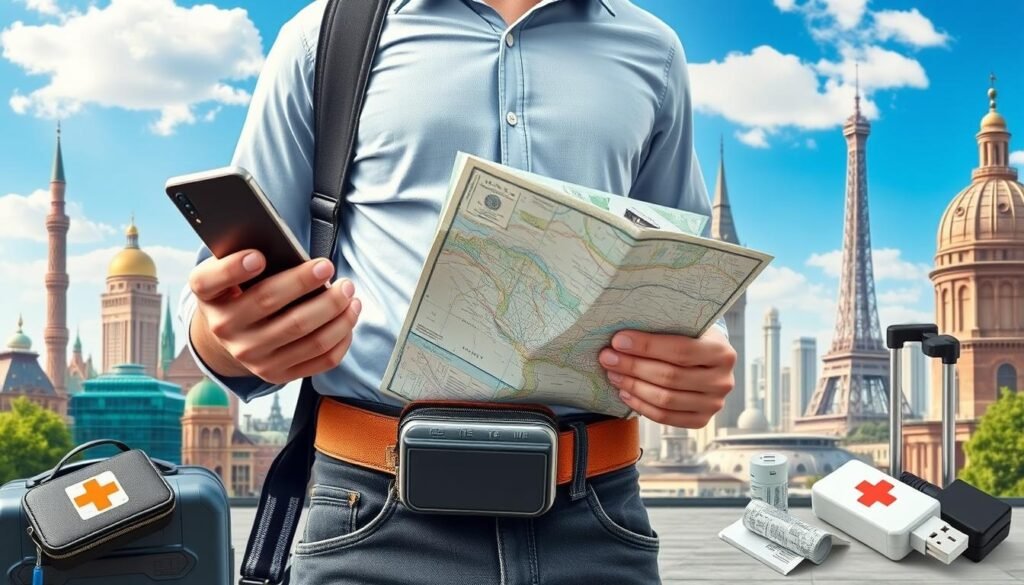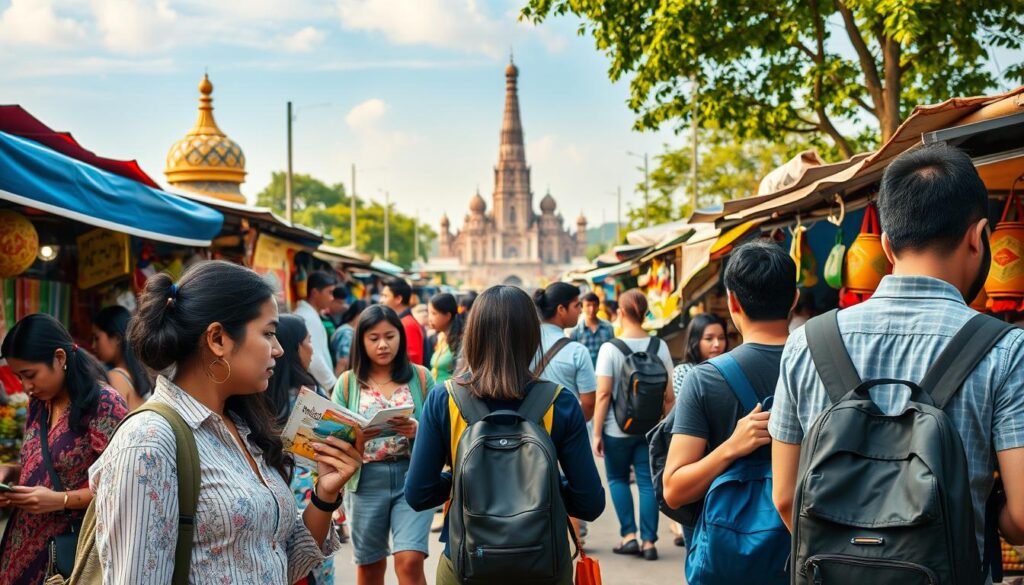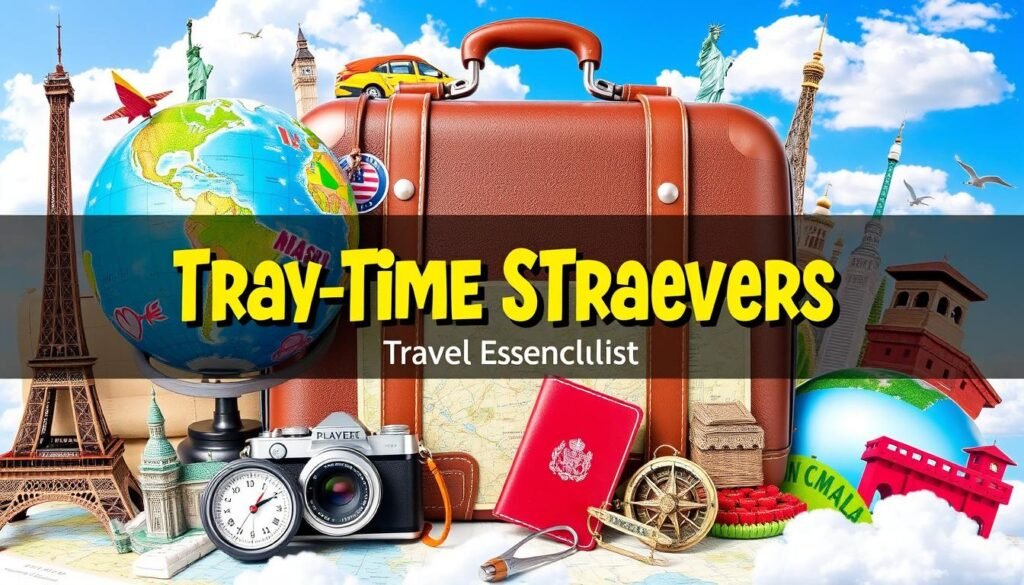Must-know tips for first-time travelers: Starting your first trip can be thrilling yet scary. You’re probably thinking about where to go and how much to spend. This guide will help you plan and stay safe, covering all the basics.
Planning your trip is key. Think about where you want to go, how much you can spend, and what you want to do. With the right gear, you’ll be ready for anything. This guide will show you how to start.
Introduction to Travel Essentials
This guide is for anyone looking to travel, whether you’re a student, a professional, or just someone who loves to explore. It’s packed with tips and advice to help you make your travel dreams come true.
Key Takeaways
- Research your destination to ensure a smooth trip
- Plan your itinerary according to your budget and preferences
- Pack essential travel essentials, such as a passport and visa
- Stay safe in unknown territories by being aware of your surroundings
- Consider purchasing travel insurance to protect yourself against unforeseen circumstances
- Stay organized and keep track of your travel documents and essentials
Essential Pre-Trip Planning Steps
Before you start packing, it’s important to plan your trip well. Choose a destination that interests you. Make a timeline that’s realistic and allows for flexibility. And, set a budget that covers all your costs without overspending.
Researching your destination is key. It helps you understand the local culture and any special needs like visas or vaccinations. A good timeline lets you enjoy each place without rushing. And, a budget helps you decide where to spend your money, whether on where to stay, eat, or what to do.
For budget travel, here are some tips:
- Research your destination to understand the cost of living and plan ahead
- Create a daily budget and track your spending to stay on track
- Look for affordable places to stay, like hostels or guesthouses
By following these steps, you can have a great trip. Always remember to pack your travel essentials and plan well for a fun budget travel experience.
With careful planning, your trip can be stress-free and enjoyable. You’ll make the most of your travel essentials and budget travel experience.
Must-Know Tips for First-Time Travelers
As a first-time traveler, knowing your surroundings is key to travel safety. Keep your valuables safe, watch your belongings, and have a plan for emergencies.
Some must-know tips for first-time travelers include researching your destination. Also, understand local customs and laws. And, stay updated on local conditions. Always have a plan for unexpected events, like medical emergencies or natural disasters.
Here are some additional tips to consider:
- Make digital copies of your important documents, such as your passport and driver’s license
- Leave a copy of your itinerary with a friend or family member
- Stay in touch with your bank and credit card company to avoid any issues with your accounts

By following these must-know tips for first-time travelers, you can have a safe and fun trip. Always stay informed, be aware of your surroundings, and have a plan for any unexpected situations.
| Tips for First-Time Travelers | Importance |
|---|---|
| Research your destination | High |
| Understand local customs and laws | High |
| Stay informed about local conditions | Medium |
Documentation and Paperwork Essentials
Before you go on your trip, make sure you have all the right documents. You’ll need a valid passport, any visas for your destination, and travel insurance. This insurance should cover any unexpected medical or travel costs.
Having a folder with all your important papers can save you in an emergency. Include copies of your passport, driver’s license, and health insurance card. Also, leave a copy with someone you trust.
Passport and Visa Requirements
Check your passport’s expiration date. It should be valid for at least six months after you return. Look into visa needs for your destination and apply early if you need to.
Travel Insurance Basics
Know what your travel insurance covers. This includes trip cancellations, medical emergencies, and lost or stolen luggage. Always read the policy details carefully and ask questions if you’re not sure.
Important Documents to Copy
Make copies of these documents and share them with someone you trust:
- Passport
- Driver’s license
- Health insurance card
- Travel itinerary
With all your documentation in order, you can relax and enjoy your trip. You’ll be free to make memories that will last a lifetime.
Smart Packing Strategies
When packing for your trip, the right packing tips are key. You want to carry everything you need without overloading. Planning your outfits and using packing cubes can help organize your stuff.
Another important packing tip is to check the weather forecast for your destination. This way, you pack the right clothes for the weather. Also, leave some extra space in your luggage for souvenirs and items you might buy.
- Packing multipurpose items, such as a scarf that can be used as a blanket or a dressy accessory
- Rolling your clothes to save space and reduce wrinkles
- Using a carry-on bag to keep essentials, such as your passport and phone charger, within easy reach
By following these packing tips, you can have a stress-free and enjoyable trip. Always prioritize the essentials and pack smart, not hard.
Navigating Transportation Like a Pro
Traveling can be tough, from airports to public transport in new places. To ease your trip, learn the basics of airport and transport navigation. Arrive early at the airport to handle any delays. Knowing what’s banned and how to speed through security can save time and stress.
For a smooth ride, get to know your destination’s public transport. Look at metro maps and bus routes. Booking your transport in advance, for busy times, helps avoid long waits. This is key at airports to skip lines.
- Researching public transportation options in advance
- Booking transportation in advance, for busy times
- Understanding airport security to avoid delays
By being prepared, you can handle airports and transport easily. Stay calm, be patient, and enjoy your trip. With some planning, you’ll navigate transport like a pro and enhance your travel.
| Mode of Transportation | Benefits | Drawbacks |
|---|---|---|
| Airport Shuttle | Convenient, affordable | May not be available at all hours |
| Public Transportation | Cost-effective, eco-friendly | Can be crowded, hard for tourists |
| Taxi or Ride-hailing | Easy, door-to-door | Expensive, language issues |
Finding the Right Accommodation
Choosing the right place to stay is important. You want it to be convenient, comfortable, and affordable. Whether it’s a fancy hotel or a cozy Airbnb, do your homework.
Think about what matters most to you: location, amenities, and reviews. Look at how close it is to public transport and if the area is safe. Also, check if basic services are available.
Some popular choices include:
- Hotels: great for amenities and services
- Hostels: budget-friendly and social
- Airbnb: unique and often more spacious
By researching and comparing, you can find the best place for you. Always read reviews and check the location before you decide.

With many options out there, you’ll find one that fits your style and budget. Happy travels!
Money Management While Traveling
Starting your journey means you need to manage your money well. Budget travel is all about planning and smart money handling. It’s key to think about things like currency exchange, banking, and having an emergency fund.
Here are some tips to help you enjoy your trip more:
- Look up currency exchange rates before you go. Avoid changing money at airports, as rates are often bad there.
- Use ATMs wisely to save on fees and get good exchange rates.
- Tell your bank and credit card companies where you’re going. This prevents any trouble with your money.
Having an emergency fund is also important. It helps you deal with unexpected costs or problems. This way, you can relax and stick to your budget travel plans. Smart money management lets you enjoy your trip without worrying about money.
Good money management is essential for a great trip. Follow these tips and keep an eye on your finances. This way, you’ll have a fun and memorable journey.
Staying Safe in Unknown Territory
Exploring new places means keeping travel safety first. It’s key to research your destination to know any safety issues. Also, check government travel advisories for the latest local conditions.
Traveling to new places requires being alert and avoiding danger. Knowing local customs and laws helps a lot. Here are some tips for staying safe:
- Stay informed about local conditions and safety concerns
- Be mindful of your surroundings and avoid risky situations
- Understand local customs and laws
- Avoid carrying large amounts of cash and use secure payment methods

By following these steps and being aware, you can enjoy a safe trip. Always put travel safety first and take care of yourself.
| Destination | Safety Concerns | Precautions |
|---|---|---|
| Urban areas | Pickpocketing, scams | Be mindful of your belongings, avoid carrying large amounts of cash |
| Rural areas | Wildlife, natural disasters | Research local conditions, stay informed about weather forecasts |
| Foreign countries | Language barriers, cultural differences | Learn basic phrases, research local customs and laws |
Knowing about safety issues and taking steps to avoid them makes for a great trip. Always remember to prioritize travel safety and take care of yourself.
Understanding Local Culture and Customs
Traveling to new places means learning about local culture and customs. This makes your trip better and helps you not offend anyone. Knowing about local traditions shows you care and helps you connect with people.
It’s important to be careful with how you act and what you do. For example, in some places, eating with your left hand is rude. Or, you might need to take off your shoes before going into someone’s home. Knowing these rules helps you act right and make a good impression.
Basic Etiquette Guidelines
- Learn a few basic phrases in the local language, such as “hello,” “thank you,” and “excuse me.”
- Respect local customs and traditions, such as dress codes and mealtime etiquette.
- Be mindful of your body language and avoid gestures that may be considered offensive.
By following these simple tips, you show respect for the local culture. This makes your trip more fun and rewarding.
Common Cultural Mistakes to Avoid
Many travelers make the mistake of not learning about local culture before they go. This can lead to misunderstandings and offense. But, by learning about local customs, you can avoid these problems and have a better time.
| Country | Local Custom | Etiquette Tip |
|---|---|---|
| Japan | Removing shoes before entering a home | Always remove your shoes before entering a Japanese home to show respect. |
| India | Eating with your right hand | Always eat with your right hand in India, as eating with your left hand is considered impolite. |
Knowing these local culture tips makes your trip better and more respectful.
Health and Wellness on the Road
When you start your journey, keeping your health and wellness in mind is key. It’s important to take steps to stay healthy and full of energy. Getting vaccinated, drinking plenty of water, and eating well are all important for your well-being.
Knowing about health issues in your destination and taking precautions can help prevent sickness. Research your place before you go and protect yourself. This way, you can avoid getting sick and have a great trip.

Here are some tips to help you stay healthy and happy on your travels:
- Stay active by walking, jogging, or doing yoga
- Make sure to get enough sleep each night
- Use meditation, deep breathing, or other ways to relax
By following these tips, you can keep your body and mind healthy while traveling. Always put your health first and seek help if you need it.
By taking care of your health and wellness, you can ensure a happy and healthy trip, and make the most of your travel experience.
| Health and Wellness Tips | Benefits |
|---|---|
| Stay hydrated | Helps prevent dehydration and maintains energy levels |
| Eat a balanced diet | Provides essential nutrients for overall health and wellness |
| Stay active | Helps maintain physical health and reduces stress |
Technology and Communication Tips
As you start your journey, staying in touch with family and friends back home is key. Technology helps you navigate new places, talk to locals, and find important info. Using the right tools and strategies can make your trip better and more fun.
For communication, having a way to stay in touch is vital. You can buy a local SIM card or use an international data plan. This lets you call, text, and browse the internet anywhere. You can also use apps like WhatsApp or Skype to keep in touch with loved ones.
Essential Travel Apps
Many travel apps can help you find your way, book places to stay, and discover cool spots. Google Maps, TripAdvisor, and Lonely Planet are great examples. They offer info, reviews, and tips to help you enjoy your trip.
Digital Safety Measures
To keep your data safe and avoid online threats, digital safety is important. Use a VPN on public Wi-Fi, be careful with links and downloads, and keep your devices updated. These steps help ensure a safe and enjoyable trip.
Technology and communication are your friends on the road. They help you stay connected, explore new places, and have a great time. Whether it’s using travel apps, keeping in touch with family, or staying safe online, tech makes your adventure better.
Conclusion: Embracing Your Journey with Confidence
As your first-time travel adventure approaches, embrace it with confidence. Follow the must-know tips for first-time travelers in this guide. You’ll be ready to face the journey ahead.
Travel is more than just reaching your destination. It’s about the experiences, people you meet, and memories you’ll keep forever.
Stay open-minded and flexible. Enjoy the ride. With the right mindset and preparation, your first trip will be just the beginning of many adventures. Explore new cultures and let the world inspire you. The thrill of discovery and joy of personal growth await you.

